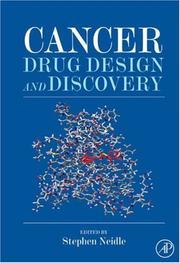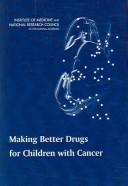| Listing 1 - 10 of 94 | << page >> |
Sort by
|
Book
Year: 2018 Publisher: Frontiers Media SA
Abstract | Keywords | Export | Availability | Bookmark
 Loading...
Loading...Choose an application
- Reference Manager
- EndNote
- RefWorks (Direct export to RefWorks)
Advances in anti-cancer chemotherapy over recent years have led to improved efficacy in curing or controlling many cancers. Some chemotherapy-related side-effects are well recognized and include: nausea, vomiting, bone marrow suppression, peripheral neuropathy, cardiac and skeletal muscle dysfunction and renal impairment. However, it is becoming clearer that some chemotherapy-related adverse effects may persist even in long term cancer survivors. Problems such as cognitive, cardiovascular and gastrointestinal dysfunction, and neuropathy may lead to substantial long term morbidity. Despite improvements in treatments to counteract acute chemotherapy-induced adverse effects, they are often incompletely effective. Furthermore, counter-measures for some acute side-effects and many potential longer term sequelae of anti-cancer chemotherapy have not been developed. Thus, new insights into prevalence and mechanisms of cancer chemotherapy-related side effects are needed and new approaches to improving tolerance and reduce sequelae of cancer chemotherapy are urgently needed. The present Research Topic focuses on adverse effects and sequelae of chemotherapy and strategies to counteract them.
toxicity --- cancer treatment --- antineoplastic drugs --- adverse effects --- chemotherapy --- toxicity --- cancer treatment --- antineoplastic drugs --- adverse effects --- chemotherapy
Book
Year: 2018 Publisher: Frontiers Media SA
Abstract | Keywords | Export | Availability | Bookmark
 Loading...
Loading...Choose an application
- Reference Manager
- EndNote
- RefWorks (Direct export to RefWorks)
Advances in anti-cancer chemotherapy over recent years have led to improved efficacy in curing or controlling many cancers. Some chemotherapy-related side-effects are well recognized and include: nausea, vomiting, bone marrow suppression, peripheral neuropathy, cardiac and skeletal muscle dysfunction and renal impairment. However, it is becoming clearer that some chemotherapy-related adverse effects may persist even in long term cancer survivors. Problems such as cognitive, cardiovascular and gastrointestinal dysfunction, and neuropathy may lead to substantial long term morbidity. Despite improvements in treatments to counteract acute chemotherapy-induced adverse effects, they are often incompletely effective. Furthermore, counter-measures for some acute side-effects and many potential longer term sequelae of anti-cancer chemotherapy have not been developed. Thus, new insights into prevalence and mechanisms of cancer chemotherapy-related side effects are needed and new approaches to improving tolerance and reduce sequelae of cancer chemotherapy are urgently needed. The present Research Topic focuses on adverse effects and sequelae of chemotherapy and strategies to counteract them.
toxicity --- cancer treatment --- antineoplastic drugs --- adverse effects --- chemotherapy
Book
Year: 2018 Publisher: Frontiers Media SA
Abstract | Keywords | Export | Availability | Bookmark
 Loading...
Loading...Choose an application
- Reference Manager
- EndNote
- RefWorks (Direct export to RefWorks)
Advances in anti-cancer chemotherapy over recent years have led to improved efficacy in curing or controlling many cancers. Some chemotherapy-related side-effects are well recognized and include: nausea, vomiting, bone marrow suppression, peripheral neuropathy, cardiac and skeletal muscle dysfunction and renal impairment. However, it is becoming clearer that some chemotherapy-related adverse effects may persist even in long term cancer survivors. Problems such as cognitive, cardiovascular and gastrointestinal dysfunction, and neuropathy may lead to substantial long term morbidity. Despite improvements in treatments to counteract acute chemotherapy-induced adverse effects, they are often incompletely effective. Furthermore, counter-measures for some acute side-effects and many potential longer term sequelae of anti-cancer chemotherapy have not been developed. Thus, new insights into prevalence and mechanisms of cancer chemotherapy-related side effects are needed and new approaches to improving tolerance and reduce sequelae of cancer chemotherapy are urgently needed. The present Research Topic focuses on adverse effects and sequelae of chemotherapy and strategies to counteract them.
toxicity --- cancer treatment --- antineoplastic drugs --- adverse effects --- chemotherapy
Book
ISBN: 0128137533 Year: 2018 Publisher: London, United Kingdom : Academic Press,
Abstract | Keywords | Export | Availability | Bookmark
 Loading...
Loading...Choose an application
- Reference Manager
- EndNote
- RefWorks (Direct export to RefWorks)
Antineoplastic agents. --- Anticancer agents --- Antineoplastic drugs --- Antineoplastics --- Antitumor agents --- Antitumor drugs --- Cytotoxic drugs --- Inhibitors, Neoplasm --- Neoplasm inhibitors --- Drugs --- Cancer --- Chemotherapy
Book
ISBN: 1608059227 9781608059225 9781608059232 Year: 2014 Publisher: Sharjah, United Arab Emirates
Abstract | Keywords | Export | Availability | Bookmark
 Loading...
Loading...Choose an application
- Reference Manager
- EndNote
- RefWorks (Direct export to RefWorks)
""Frontiers in Anti-Cancer Drug Discovery"" is an Ebook series devoted to publishing the latest and the most important advances in Anti-Cancer drug design and discovery. Eminent scientists write contributions on all areas of rational drug design and drug discovery including medicinal chemistry, in-silico drug design, combinatorial chemistry, high-throughput screening, drug targets, recent important patents, and structure-activity relationships. The Ebook series should prove to be of interest to all pharmaceutical scientists involved in research in Anti-Cancer drug design and discovery. Each vo
Antineoplastic agents. --- Anticancer agents --- Antineoplastic drugs --- Antineoplastics --- Antitumor agents --- Antitumor drugs --- Cytotoxic drugs --- Inhibitors, Neoplasm --- Neoplasm inhibitors --- Drugs --- Cancer --- Chemotherapy
Book
ISBN: 1681083892 9781681083896 Year: 2017 Publisher: Sharjah Bentham Science Publishers
Abstract | Keywords | Export | Availability | Bookmark
 Loading...
Loading...Choose an application
- Reference Manager
- EndNote
- RefWorks (Direct export to RefWorks)
Frontiers in Anti-Cancer Drug Discovery is a book series devoted to publishing the latest and the most important advances in anti-cancer drug design and discovery. Eminent scientists write contributions on all areas of rational drug design and drug discovery including medicinal chemistry, in-silico drug design, combinatorial chemistry, high-throughput screening, drug targets, recent important patents, and structure-activity relationships. The book series should prove to be of interest to all pharmaceutical scientists involved in research in anti-cancer drug design and discovery. Each: Volume is devoted to the major advances in anti-cancer drug design and discovery. The book series is essential reading to all scientists involved in drug design and discovery who wish to keep abreast of rapid and important developments in the field.The eighth: Volume of the series features chapters covering the following topics:- T cells in gastrointestinal cancers- The pharmacology of adjudin - a male contraceptive with anti-cancer properties- Manipulating the tumor microenvironment- Treatment of hepatocellular carcinoma- Gold-based compounds as potential anti-cancer drug candidates- Oral nanostructure drug delivery for anti-cancer treatment
Antineoplastic agents. --- Anticancer agents --- Antineoplastic drugs --- Antineoplastics --- Antitumor agents --- Antitumor drugs --- Cytotoxic drugs --- Inhibitors, Neoplasm --- Neoplasm inhibitors --- Drugs --- Cancer --- Chemotherapy

ISBN: 1281763683 9786611763688 0080554954 0123694485 9780123694485 9780080554952 Year: 2008 Publisher: New York Academic Press
Abstract | Keywords | Export | Availability | Bookmark
 Loading...
Loading...Choose an application
- Reference Manager
- EndNote
- RefWorks (Direct export to RefWorks)
The ultimate source of information on the design of new anticancer agents, emphasizing small molecules, this newest work covers recent notable successes resulting from the human genome and cancer genomics projects. These advances have provided information on targets involved in specific cancers that are leading to effective medicines for at least some of the common solid tumors. Unique sections explain the basic underlying principles of cancer drug development and provide a practical introduction to modern methods of drug design.
Antineoplastic agents --- Development. --- Design. --- Anticancer agents --- Antineoplastic drugs --- Antineoplastics --- Antitumor agents --- Antitumor drugs --- Cytotoxic drugs --- Inhibitors, Neoplasm --- Neoplasm inhibitors --- Drugs --- Cancer --- Chemotherapy
Book
ISBN: 0123972280 0123965217 1299954235 9780123972286 9780123965219 9780123965219 Year: 2014 Publisher: Amsterdam Elsevier Science
Abstract | Keywords | Export | Availability | Bookmark
 Loading...
Loading...Choose an application
- Reference Manager
- EndNote
- RefWorks (Direct export to RefWorks)
Antineoplastic agents --- Cancer --- Design. --- Chemotherapy. --- Anticancer agents --- Antineoplastic drugs --- Antineoplastics --- Antitumor agents --- Antitumor drugs --- Cytotoxic drugs --- Inhibitors, Neoplasm --- Neoplasm inhibitors --- Drugs --- Treatment --- Chemotherapy

ISBN: 1282083325 9786612083327 0309549256 9780309549257 6612083328 0309096081 9780309096089 0309181860 Year: 2005 Publisher: Washington, D.C. National Academies Press
Abstract | Keywords | Export | Availability | Bookmark
 Loading...
Loading...Choose an application
- Reference Manager
- EndNote
- RefWorks (Direct export to RefWorks)
Antineoplastic agents. --- Oncology. --- Tumors --- Anticancer agents --- Antineoplastic drugs --- Antineoplastics --- Antitumor agents --- Antitumor drugs --- Cytotoxic drugs --- Inhibitors, Neoplasm --- Neoplasm inhibitors --- Drugs --- Cancer --- Chemotherapy
Book
ISBN: 1608057984 9781608057986 9781608057993 Year: 2014 Publisher: Sharjah, United Arab Emirates
Abstract | Keywords | Export | Availability | Bookmark
 Loading...
Loading...Choose an application
- Reference Manager
- EndNote
- RefWorks (Direct export to RefWorks)
Frontiers in Clinical Drug Research - Anti-Cancer Agents - Volume 1 should prove to be a valuable resource for pharmaceutical scientists and postgraduate students seeking updated and critical information for developing clinical trials and devising research plans in the field. The chapters in this volume have been written by leading experts from the field.The contents of this book include new approaches to cancer therapy, treatment of metastatic non-small cell lung cancer with epidermal growth factor receptor-tyrosine kinase inhibitors, targeting key signaling pathways in pediatric brain tumors
Cancer --- Antineoplastic agent. --- Alternative treatment. --- Alternative therapy --- Treatment --- Antineoplastic agents. --- Anticancer agents --- Antineoplastic drugs --- Antineoplastics --- Antitumor agents --- Antitumor drugs --- Cytotoxic drugs --- Inhibitors, Neoplasm --- Neoplasm inhibitors --- Drugs --- Chemotherapy
| Listing 1 - 10 of 94 | << page >> |
Sort by
|

 Search
Search Feedback
Feedback About UniCat
About UniCat  Help
Help News
News